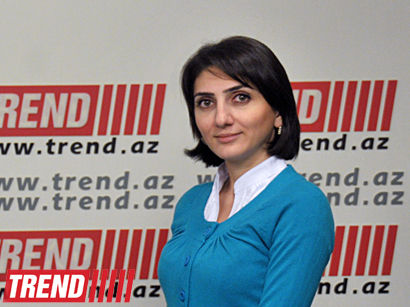Azerbaijan, Baku, Jan. 22 / Trend /
Ellada Khankishiyeva, Trend analytical centre head
This year, the Central Asian countries will join the ranks of members of the World Trade Organization (WTO)
Thus, Tajikistan received approval from the WTO on December 10, 2012, and will become a full member of the organization by June 7, 2013. Tajikistan took 11 years to become a WTO member.
Last week, Kazakhstan received an encouraging message from the WTO Director-General Pascal Lamy, expressing the possibility of Kazakhstan's accession to the WTO this year. According to Lamy, Kazakhstan is at a fairly advanced stage of membership negotiations. Kazakhstan is a country that has been exhibiting maximum initiative to join the WTO for over 17 years.
Turkmenistan will also start negotiations for accession to the WTO this year, although previously it had no interest in the organization. Turkmen President Gurbanguly Berdimuhamedov stated the need to study the issue of Turkmen accession to the WTO at a Cabinet meeting last week. In this regard, Berdimuhamedov ordered the preparation of a proposal for the establishment of a special government commission and the start of negotiations with the heads of the WTO.
Uzbekistan acquired observer status in 2001.
Among all Central Asian countries only Kyrgyzstan is a WTO member and has been since December 20, 1998. Considering that the negotiation process began in 1996, one can say that the country has broken the world record for the shortest time period for entry into the organization.
The entry of new Central Asian countries to the WTO will increase the region's share of global trade, stimulate investment projects and have a positive impact on the economic development of the region as a whole. It should also be noted that the positive effects underlying the concept of the WTO appear only when the national economy has an optimal level of preparedness for the new conditions of trade. If not, the benefits of joining the WTO will be possible only in the long run, whereas, in the short term, the country is to deal with losses only.
Following the sad example of neighboring Kyrgyzstan, which headlong joined the organization in the most unfavorable conditions, other Central Asian countries have become more cautious. It is known that in the process of negotiations with the WTO, Kyrgyzstan didn't even ask about receiving developing country status, and in addition, displayed maximum compliance with general obligations in law-making areas, and concerning the rates, was ahead of all countries in terms of commitment to liberalism.
In the end, the entry of Kyrgyzstan to the WTO didn't usher in the expected results. The wide open "door" for imported goods prevented investors from entering the Kyrgyz market. Trade with major neighboring partners (Kazakhstan, Uzbekistan), who are non-WTO members, encountered discriminatory measures. Recall that in response to Kyrgyzstan's accession to the WTO, Kazakhstan and Uzbekistan introduced discriminatory measures against imports from Kyrgyzstan. Kazakhstan set a 200-percent duty on Kyrgyz food exports and explained these actions as an attempt to prevent the filling of its market by imports from Kyrgyzstan. Kazakhstan and Uzbekistan still occasionally impose increased customs duties on imports of various goods from Kyrgyzstan. These discriminatory measures against Kyrgyzstan will apply as long as its neighbors don't accede to the WTO.
If the aforementioned measures were taken towards Kyrgyzstan by WTO member countries, the latter would thereby have violated its obligations under WTO agreements and Kyrgyzstan would be able to challenge such actions in the WTO. Thus, the obvious conclusion is that WTO membership provides real benefits only when major trading partners are also members of the WTO.
Therefore, the entry of other Central Asian countries to the WTO will relieve current tensions in regional trade and economic relations and commercial interests will be protected through international mechanisms. For example, with the entry of Russia last year (and Kazakhstan in the future), WTO members will account for nearly 90 percent of Kyrgyzstan's foreign trade turnover. The same goes for Tajikistan, three of the four major trading partners of which, excluding Kazakhstan, are already members of the WTO (Russia, China, and Turkey).
China, an active player in the WTO, supports the accession of neighboring countries into the trading organization, as there is an ongoing process of practical implementation of large and strategically important joint economic projects between China and the Central Asian countries. Thus, the value of Kyrgyzstan as a transshipment base for Chinese consumer goods especially increased when the two countries became members of the WTO. This was followed by Chinese products entering Kyrgyzstan in the progressive scale and virtually unhindered. Upon entering the WTO, Russia also played a role in supporting Central Asian countries in their involvement in global trade, especially given that Russia is also connected to those countries through regional trade organizations.
WTO membership for the countries of Central Asia is attractive in terms of participation in transit projects as well, due to the region's prime location between Russia, China, Iran and the Caucasus. Recall that membership in the WTO provides guaranteed transit through the territory of all other WTO members. Regional investment projects will also be given impetus to. But again it should be noted that the Central Asian countries will benefit from these privileges of the WTO only through joint participation in the organization, otherwise the region will become futile in the global economic system.






